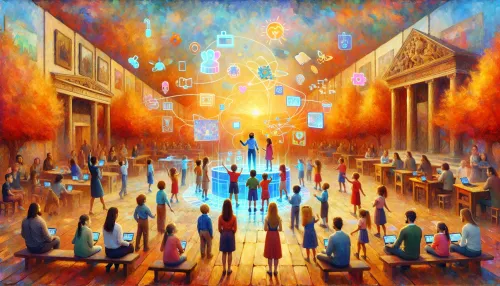Adaptive Technologies in Autism Care: Innovations from Urban Centers

In today's rapidly advancing world, urban centers have emerged as hotbeds of technological innovation, and the realm of autism care is no exception. The intersection of urban development and cutting-edge technology has given rise to a wave of innovative adaptive solutions for autistic children, promising a future where care and support are more accessible, tailored, and effective than ever. Let's delve into the latest trends and predictive outlooks shaping the landscape of autism care in urban settings.
Urban education systems are embracing technology to create inclusive learning environments for autistic children. The integration of assistive technologies and personalized learning platforms not only supports academic growth but also fosters greater independence and confidence among students on the autism spectrum. These innovations aim to cater to diverse learning styles, offering custom-tailored educational experiences that empower autistic individuals to thrive in academic settings.
How technology enhances learning for autistic children
Sensory sensitivities are common among individuals with autism, often presenting challenges in daily routines. Urban centers are pioneering technological solutions designed to mitigate sensory overload and support sensory integration for autistic children. From wearable sensory devices to sensory-friendly urban design, these innovations seek to create harmonious sensory environments that ease anxiety and enhance overall well-being.
Technological Solutions for Sensory Sensitivities
The advent of virtual therapeutic platforms has revolutionized access to specialized interventions for autistic children in urban areas. Through teletherapy and virtual reality applications, urban caregivers can now harness the power of immersive therapies and remote consultations, breaking down geographical barriers and ensuring consistent access to high-quality interventions. These platforms not only expand reach but also promote greater engagement and enthusiasm in therapy sessions.
Innovations to support sensory integration
Artificial Intelligence (AI) is driving a paradigm shift in communication support for autistic individuals in urban settings. AI-powered communication aids leverage natural language processing and predictive algorithms to facilitate expressive communication, social interactions, and language development. By tailoring responses to individual preferences, these aids empower autistic individuals to communicate effectively, thereby fostering greater independence and social inclusion.
Improving access and engagement in therapy
Smart home technologies are reshaping the landscape of independent living for autistic individuals in urban environments. From voice-activated assistants to smart environmental controls, these innovations aim to enhance autonomy, safety, and comfort within the home environment. By streamlining daily routines and providing personalized support, smart home technologies empower autistic individuals to navigate daily activities with greater ease and self-reliance.
Related Article: Wearable Tech Advancements: Empowering Autistic Children with Innovative Therapeutic Interventions
Enhancing communication for autistic individuals
Urban-centric digital resource hubs have emerged as invaluable repositories of information, guidance, and community support for parents and caregivers of autistic children. These platforms offer a wealth of resources, ranging from informational articles and expert advice to peer support networks, empowering caregivers with the knowledge and tools needed to navigate their journey effectively.
Smart Home Technologies for Independence
Telehealth services have emerged as a vital conduit for delivering specialized healthcare services to autistic children in urban areas. Whether accessing diagnostic assessments or ongoing medical consultations, telehealth bridges geographical gaps, ensuring timely interventions and expert guidance for families regardless of their proximity to specialized healthcare facilities.
How smart technology supports daily living
The concentrated synergy of urban innovation hubs is propelling groundbreaking research efforts focused on advancing autism care. From novel therapies harnessing neurotechnology to data-driven insights shaping precision interventions, urban centers are at the vanguard of driving transformative shifts in autism care practices.
The role of online resources in autism care
In conclusion, the dynamic confluence of adaptive technologies within urban centers is ushering in a new era of enhanced care, support, and inclusivity for autistic children. As we look toward the future, these innovative advancements hold immense promise in revolutionizing the landscape of autism care while nurturing a more equitable and fulfilling life journey for individuals on the autism spectrum.
Frequently Asked Questions
Adaptive technologies in autism care include assistive learning platforms, wearable sensory devices, AI-powered communication aids, and smart home technologies. These innovations aim to enhance independence, support sensory integration, and improve communication for autistic individuals, fostering a more inclusive environment.
Virtual therapeutic platforms provide accessible interventions for autistic children by utilizing teletherapy and virtual reality applications. They break down geographical barriers, ensuring consistent access to specialized care while promoting engagement and enthusiasm in therapy sessions, ultimately enhancing the effectiveness of treatments.
Digital resource hubs serve as essential support systems for parents of autistic children by offering valuable information, expert advice, and community connections. These platforms empower caregivers with the knowledge and tools needed to navigate challenges effectively, fostering a supportive environment for their children.
Check Out These Related Articles

Data-Driven Parenting: Leveraging Technology for Informed Decision-Making in Autism Care

Influential Innovations: How Gaming Communities Are Redefining Inclusive Spaces for Autistic Children

Tech-Driven Innovations in Autism Assessment and Early Intervention: Adapting to Digital Frontiers
